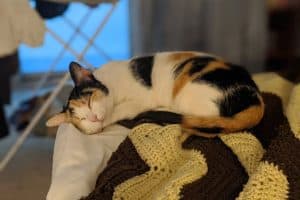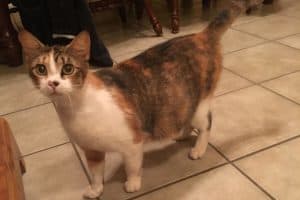Pregnancy can be an exciting time for both humans and their furry companions. However, when you notice brown discharge in your pregnant cat, it’s natural to feel concerned and want to understand what might be causing it. In this blog post, we will explore why your pregnant cat may have brown discharge and what steps you can take to ensure her health and well-being throughout this crucial time.
Why is My Pregnant Cat Having Brown Discharge?
Understanding the Basics of Cat Pregnancy
Welcoming a litter of kittens to your home is an exciting journey, but it’s essential to understand the signs of cat pregnancy to ensure a smooth process. During the initial stages of gestation, your pregnant cat may exhibit increased appetite, weight gain, and even some behavioral changes. As the pregnancy progresses, you might notice her abdomen swelling, her nipples becoming enlarged, and a quieter demeanor.
It’s crucial to monitor your cat closely and provide her with extra care and attention during this time. Make sure she has a comfortable and quiet space to rest, and consult with your veterinarian for regular check-ups to ensure both mom and kittens are healthy throughout the pregnancy.
Common Causes of Brown Discharge in Pregnant Cats
While it’s normal for pregnant cats to experience some vaginal discharge, brown discharge may raise concerns among pet owners. One common reason for this could be hormonal changes as the body prepares for birth. In some cases, infections such as bacterial or fungal infections can also lead to brown discharge. Additionally, complications like a miscarriage or placental problems may be underlying causes.
If you notice brown discharge in your pregnant cat, it’s crucial to seek veterinary attention promptly. Your vet can determine the exact cause of the discharge and provide appropriate treatment to ensure the health and well-being of your cat and her kittens. Remember, early detection and intervention can make a significant difference in the outcome of the pregnancy.
Extra Tip: In some instances, brown discharge in pregnant cats may be a sign of pyometra, a serious infection of the uterus. This condition requires immediate medical attention to prevent severe complications.
When to Seek Veterinary Care
If your pregnant cat is experiencing brown discharge, it’s crucial to know when to seek veterinary care. While some discharge is normal during pregnancy, if it appears brown or has a foul odor, it could indicate an infection or other serious issue. If you notice this type of discharge, along with other concerning signs such as lethargy, loss of appetite, or difficulty breathing, do not hesitate to contact your veterinarian for guidance. Remember, it’s always better to be safe than sorry when it comes to the health of your furry friend.
Home Care Tips for Pregnant Cats
Taking care of a pregnant cat involves more than just providing food and water. To support her health during this crucial time, ensure she is receiving a high-quality, balanced diet that meets her increased nutritional needs. Additionally, create a quiet, comfortable environment for her to rest and prepare for giving birth. Providing a nesting box with soft bedding can help her feel safe and secure when the time comes. Finally, encourage gentle exercise to keep her muscles toned and help with the birthing process. By taking these proactive steps, you can help ensure a smooth pregnancy and delivery for your beloved feline companion.
- Monitor Weight Gain: Keep an eye on your cat’s weight throughout her pregnancy to ensure she is gaining at a healthy rate. Sudden weight loss or excessive weight gain could indicate a problem that requires veterinary attention.
- Regular Vet Check-ups: Schedule regular check-ups with your veterinarian to monitor the progress of the pregnancy and address any concerns that may arise. This proactive approach can help catch any issues early and ensure the best possible outcome for your cat and her kittens.
- Provide Emotional Support: Pregnancy can be a stressful time for your cat, so be sure to offer plenty of love and attention to help her feel secure and relaxed.
Remember, always consult with your veterinarian for personalized advice specific to your cat’s needs during pregnancy.
Preventive Measures to Ensure a Healthy Pregnancy
If you notice brown discharge in your pregnant cat, it’s essential to take proactive steps to ensure a healthy pregnancy. Schedule regular check-ups with your veterinarian to monitor your cat’s health and address any concerns promptly. Provide a nutritious diet tailored to meet the specific needs of a pregnant cat. Create a comfortable and stress-free environment for your cat to minimize potential complications. Avoid exposing your cat to harmful substances and provide proper exercise to keep her in good shape. By implementing these preventive measures, you can help reduce the risk of complications during your cat’s pregnancy and delivery.
Risks Associated with Brown Discharge in Pregnant Cats
While brown discharge in pregnant cats can be alarming, it’s essential to understand the potential risks and complications associated with it. In some cases, brown discharge may indicate an infection or placental problems that require immediate veterinary attention. Monitor your cat closely for other symptoms such as fever, lethargy, or loss of appetite, which could indicate a more serious issue. Avoid self-diagnosis and seek professional veterinary advice to determine the underlying cause of the discharge and appropriate treatment. By being vigilant and proactive, you can effectively address any potential risks and ensure the well-being of your pregnant cat.
Additional Unique Insight:
- Keep a close eye on your cat’s behavior: Changes in behavior such as excessive grooming, restlessness, or nesting behaviors could be early signs of impending labor. By observing your cat closely, you can better anticipate when she is ready to deliver her kittens and provide the necessary support during this crucial time.
The Role of Nutrition in Supporting a Pregnant Cat
When it comes to your pregnant feline friend, providing the right nutrition is crucial for a healthy pregnancy. A well-balanced diet rich in essential nutrients like protein, vitamins, and minerals is key to supporting your cat during this important time. Look for cat food specifically formulated for pregnant cats, as it contains the additional nutrients needed to support her and her growing kittens. Consider adding supplements like folic acid to further promote a healthy pregnancy.
Remember, hydration is also vital, so make sure your cat has access to fresh water at all times. If you have any concerns about your cat’s diet or nutritional needs during pregnancy, it’s always a good idea to consult with your veterinarian for personalized advice.
Interesting Facts About Cat Pregnancy
Curious about what to expect during your cat’s pregnancy? Here are some fascinating facts to help you better understand this special time:
- Gestation Period: A cat’s pregnancy typically lasts around 63 to 65 days, with some variation depending on the individual cat.
- Number of Kittens: On average, a cat can give birth to a litter of 4 to 6 kittens, but litter sizes can range from 1 to 12 kittens.
- Nesting Behavior: As the due date approaches, your cat may exhibit nesting behaviors like seeking out quiet, secluded spots to give birth.
- Postpartum Care: After giving birth, it’s important to provide your cat with a safe, warm space to care for her kittens. Monitor her closely for any signs of complications or health issues.
By staying informed and prepared for your cat’s pregnancy journey, you can ensure a smooth and healthy experience for both your cat and her kittens. Remember, regular veterinary check-ups and proper care are essential for a successful and stress-free pregnancy.
Alex, a passionate animal lover, has experience in training and understanding animal behavior. As a proud pet parent to two dogs and three cats, he founded AnimalReport.net to share insights from animal experts and expand his knowledge of the animal kingdom.




